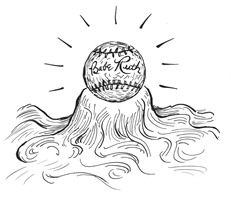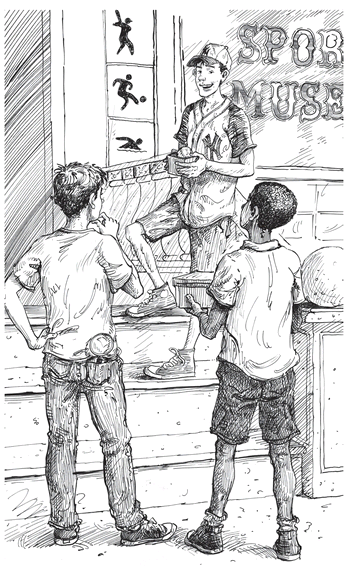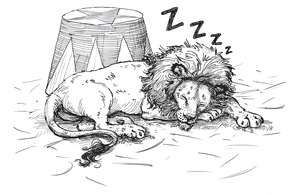Encyclopedia Brown and the Case of the Carnival Crime (3 page)
Read Encyclopedia Brown and the Case of the Carnival Crime Online
Authors: Donald Sobol

BOOK: Encyclopedia Brown and the Case of the Carnival Crime
5.8Mb size Format: txt, pdf, ePub
Chief Brown, Mrs. Brown, and Encyclopedia were waiting in line for Fiona Slocum's concert. Slocum was the chief's favorite country western singer.
“I can't believe Fiona Slocum is actually performing here in Idaville,” he remarked. “I've heard her on the radio often. I never expected to see her performing live. You two will love her.”
“We're lucky she's playing in Idaville,” said Mrs. Brown. “She used to tour in big cities all over the world.”
“I remember,” said Encyclopedia. “Her first album,
Sweet Tea and Sour Grapes,
was very successful.”
Sweet Tea and Sour Grapes,
was very successful.”
“That's right,” Chief Brown said. “And she had that smash single, âYou're Over the Hill, Not Under It'âwhich was a tribute to her grandfather. That was two years ago. New acts have come along since then. She took some time off after the last tour. Something about recharging her batteries. Now she's back. Playing in smaller places like Idaville is a way to start the climb back to the top.”
“Maybe you'll be able to get her autograph,” said Mrs. Brown.
Chief Brown said, “Our seats won't get us close enough for that.”
“You're the Chief of Police,” Mrs. Brown reminded him. “Maybe something will come up that demands your attention.”
“I doubt it,” said the Chief. “Fiona's fans are hardly a rowdy bunch. We're not expecting any trouble.”
“Trouble may be on its way,” said Encyclopedia. “Here come two of your officers.”
Encyclopedia was right. The officers explained that the Chief was needed at once.
They led the Browns backstage. All kinds of people were wandering about making preparations for the concert. Among them was a tall man with a thick mustache that curled up at the ends.
“Why, you're Colonel Abner Singleton,” said Chief Brown. “Fiona Slocum's manager.”
“Indeed I am. And you, sir, are?”
Chief Brown introduced himself and his family.
“A pleasure,” said the colonel. “My title is honorary. I cherish it, nonetheless. I only regret that we meet at such a difficult time.”
“Why is it difficult?” the Chief asked.
“As I was telling your good officers, there's been a robbery.”
“Of what?” asked the Chief. “Money? Jewels? Furs?”
“No, what's been taken are Fiona's latest songs,” the colonel answered. “She was planning to perform them tonight for the first time. She had shown them to no one, not even me, and she had only one written copy.”
“That would make the copy about as valuable as rare jewels,” the Chief commented.
“I see you are a fan, sir,” the colonel went on. He lowered his voice. “You may know that Fiona has gone through a bit of a dry spell lately. This concert tour was going to renew her career.”
“Where were the songs taken from and when?” asked the Chief.
“From her dressing room, perhaps an hour ago. At least that's when she first noticed they were missing.”
“Where is Miss Slocum now?”
“She has asked to be alone.”
“Can she rewrite the songs from memory?” Encyclopedia asked.
The colonel paced back and forth. “Perhaps another singer might. You see, it was Fiona's gift to pour her heart and soul onto paper. But her memory has never been strong. Even when performing songs she's done a hundred times before, she always reads from the sheet music. I begged her to entrust me with a copy for safekeeping. She refused. She kept the new songs a secret.”
“Are there any other facts for us to start with?” asked the Chief.
“There is a suspect,” said the colonel.
“Who would that be?” asked Chief Brown.
“A fan who is crazy about her,” the colonel said. “Naturally, Fiona enjoys and appreciates everyone who likes her music. This one fellow, however, follows her around from concert to concert.”
“Has he done anything illegal in the past?”
“Not that I know of,” the colonel replied. “Still, I'm sure he is guilty.”
“Do you know his name?” the Chief asked.
“His first name is Chuck. At least that's the name he uses when sending Fiona his fan letters.”
The colonel rubbed his hands together. “You've got to solve this case before Fiona is scheduled to sing tonight. Without those new love songs, her comeback will be ruined.”
“If the fan is guilty, we'll find the proof,” the Chief assured him.
“It's not the proof I'm worried about,” said the colonel. “It's the songs that matter.”
“I'm sure they're perfectly safe,” said Encyclopedia.
Â
WHY WERE THEY SAFE?
Â
Â
Â
(Turn to page 80 for the solution to “The Case of the Missing Songs.”)
The Case of the Home-run Hitter

It was a slow morning at the Brown Detective Agency. Encyclopedia and his junior partner, Sally Kimball, were playing catch in the side yard. Sally was working on her curveball till a customer arrived.
“If I'm going to win games this summer,” said Sally, “I need to have more than one pitch.”
“Are you sure?” said Encyclopedia. “Nobody seems to have much luck against your fastball.”
“True,” Sally admitted. “But if the batters wise up to the fact that that's all I have got, sooner or later they'll be pounding out hits.”
“I'd say later,” said Chip Caswell, riding up on his bike. “When it happens, I'll try to get a few balls to add to my collection.”
Nobody liked to collect baseball souvenirs more than Chip Caswell. He saved the ticket stubs from every game he'd ever been to. His baseball cards filled six shoe boxes. He might have had even more if his parents hadn't complained that his hobby was taking over his room. He had collected signed balls, bats, cards, and caps from teams all over the country.
“Did you hear the news?” he asked.
“Does it have something to do with baseball?” asked Encyclopedia.
“I'll say. There's a new sports museum opening up in Idaville, and they've offered a spot in the main hall for a kid to donate something,” Chip said.
“And you're ready to give?” asked Encyclopedia.
“Sure. If they pick something of yours, you get to have your name on a plaque for everyone to see.”
“That's pretty exciting,” said Sally. “But why do you need us?”
“The museum has put out a notice saying they will be examining donations at noon today. I figure there will be a long line of kids with stuff to donate. I want you to see what they have, and then tell me which of these I need to offer to make sure my donation gets picked,” Chip said.
Encyclopedia looked at his watch. “It's eleven thirty now. I guess we'd better get going.”
When they arrived at the museum, they got a surprise. There was no long line of kids. Only one person was standing thereâSammy Jackson. He was one of Bugs Meany's Tigers. They were so slippery, the truth wouldn't stick to them if you pasted it on with a bucket of glue.
“Where's the line?” asked Chip.
Sammy smiled at him. “You're looking at it.”
Chip shook his head. “I can't believe nobody else came.”
“Oh, they came,” said Sammy, “and then they left.”
“Why would they do that?” Encyclopedia asked.
“Couldn't take the competition,” Sammy explained. “Once they saw what I was offering, they just disappeared.”
“And what have you got?” Chip asked.
Sammy smiled. He took out a box and removed the lid. A baseball was sitting inside on a velvet base. “That, my friend, is a baseball hit by the great George Herman Ruth. I'm talking about the Bambino, the Sultan of Swat, the greatest hitter who ever lived. Now, if this were simply a ball that the Babe had hitâeven for an outâit would be valuable. This is more than that. This is a ball Ruth hit for a home run.”

“Couldn't take the competition,” Sammy explained. “Once
they saw what I was offering, they just disappeared.”
they saw what I was offering, they just disappeared.”
Chip gasped.
“Since you brought along Encyclopedia Brown,” said Sammy, “I'm sure he will agree that Babe Ruth hit seven hundred and fourteen home runs over his long career. Isn't that right, Encyclopedia?”
“Yes,” Encyclopedia agreed.
“I thought so.” Sammy grinned at him. “By the way, the Babe ate even more hot dogs during his career than he hit homers. He was famous for downing as many as a dozen before some games. Those hot dogs are long gone. This baseball is not. In fact, it has a further claim to fame. This baseball was one that Babe Ruth hit on a day when he hit three home runs.”
Chip had closed his eyes, as if trying to imagine the scene.
“The homer was hit in Yankee Stadium, home of the Yankees before the stadium was torn down,” Sammy said. “I was never in Yankee Stadium. My great-uncle lived nearby and went to as many games there as he could afford. He never left before a game was over, and so he found himself sitting almost alone in the bleachers when Babe Ruth came up in the bottom of the ninth. The game itself was not in doubt. The Yankees were leading by three runs. My uncle liked to get his money's worth. This was his lucky day because when Babe Ruth took a mighty swing with two strikes, the ball sailed in his direction. It landed a couple of rows beneath him and bounced up to his waiting hands. The home run was not a game winner since the Yankees were already ahead, but it still represents a piece of baseball history.”
Chip sighed. “What a story!” he said
Sammy nodded. “Not long ago my great-uncle passed away. He left me the ball in his will. I am not the baseball fan he was, and it seems only proper that the ball end up in a museum where everyone can enjoy it.”
Chip turned to leave. “We might as well go, Encyclopedia. My collection is pretty good, but I don't have anything to compete with that.”
“Don't be in such a hurry,” said Encyclopedia. “I think we have a foul play here. That ball is a fake.”
Â
WHAT REVEALED IT AS A FAKE?
Â
Â
Â
(Turn to page 81 for the solution to “The Case of the Home-run Hitter.”)
The Case of the Lazy Lion

From his seat in the big circus tent, Encyclopedia Brown had a good view of the acts in the center ring.
“I think these are our best seats yet,” said Chief Brown.
“They're certainly the closest,” said Mrs. Brown.
Every year, the Browns drove into town to see the circus. The owner, Phineas Dailey, was an old friend of the Chief's, and he never failed to send them tickets. The Browns, in turn, were always delighted to attend. The circus wasn't about tricks, the Chief liked to say. It was about skill, daring, and showmanship.
Other books
Jailbird by Heather Huffman
Faith by Michelle Larks
Little Mermaid (Futanari Erotica Fairy Tales Book 7) by Julie Law
Blown To Pieces (PTO Murder Club Mystery Book 2) by Katie Graykowski
Cornered by Cupcakes by S.Y. Robins
Under a Blood Red Sky by Kate Furnivall
The Child Inside by Suzanne Bugler
SexedUp by Sally Painter
Mrs. Houdini by Victoria Kelly
Fantastic Beasts and Where to Find Them by J.K. Rowling
